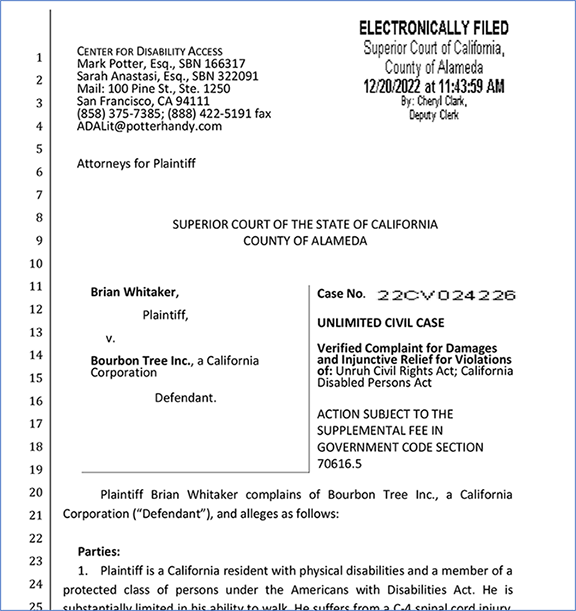The Center for Disability Access (AKA Potter Handy, LLP) has filed thousands of lawsuits on behalf of serial plaintiffs for alleged violations of the Americans with Disabilities Act (ADA), the California Unruh Civil Rights Act, and/or the California Disabled Persons Act.
The lawsuit is generally filed on behalf of one of the plaintiffs listed below:
- Scott Johnson
- Brian Whitaker
- Antonio Fernandez
- Orlando Garcia
- James Zarian
- Nehemiah Kong
- Luis Marquez
Most commonly these days, the lawsuit is filed in Superior Court for the State of California – often the County of Los Angeles. Sometimes the lawsuits are filed in other counties in the state. The lawsuit will allege that the plaintiff is disabled and visited the property but encountered barriers to access. The complaint will generally look something like this:

If you are served with a lawsuit like this, either by mail or in person, you have a limited time to respond to the complaint. If the lawsuit was filed in California Superior Court, you have 30 days to respond; if it was filed in U.S. District Court (federal court), you have 21 days.
One might be misled by thinking that the lawsuit is only about a dining table, counter or parking space. But buried deep inside these cases you will find reference to Doran v. 7‐Eleven, 524 F.3d 1034 (9th Cir. 2008). In that case, a court held that once a plaintiff encounters one barrier at a site, she can sue to have all barriers that relate to her disability removed regardless of whether she personally encountered them. Plaintiffs will often use this precedent to try to expand the scope of a lawsuit to include new barriers and issues not specifically mentioned in the original complaint.
You should work with your legal counsel to determine if the claims have merit and whether any relevant defenses apply. Some lawsuits can be defended. Perhaps the property is ADA compliant and the claims are simply untrue. Perhaps the plaintiff lacks judicial standing to raise the claims because the barriers alleged, even if they exist, don’t relate to the plaintiff’s disability. Perhaps the court has no jurisdiction. See my articles on these topics:
How To Defend An ADA Or Unruh Lawsuit For Lack Of Standing by Stuart Tubis
California Unruh Civil Rights Act Law Basics by Stuart Tubis
Alternatively, you can explore settlement of the case. The goal of this approach is to negotiate the best terms available given the facts. JMBM attorneys seek to leverage defense evidence on your behalf and negotiate the best outcome possible when settlement is the goal. This includes a low settlement payment amount, plenty of time to update the property, and a full release of liability with full dismissal of the lawsuit. Resolving the lawsuit in the most efficient way possible is the ultimate objective.
If you have questions about these cases or how to handle them, please reach out to me at skt@jmbm.com or 415-984-9622. I can let you know if our firm is taking on new clients or refer you to other competent counsel.
 Stuart K. Tubis is a partner attorney at Jeffer Mangels Butler & Mitchell LLP and a member of JMBM’s ADA Compliance & Defense Group. Stu counsels businesses and landlords on the full spectrum of ADA compliance issues and represents their interests in litigation and Department of Justice investigations. He has a background in technology, which helps in resolving the growing area of website accessibility issues. Contact Stuart K. Tubis at 415.984.9622 or SKT@jmbm.com.
Stuart K. Tubis is a partner attorney at Jeffer Mangels Butler & Mitchell LLP and a member of JMBM’s ADA Compliance & Defense Group. Stu counsels businesses and landlords on the full spectrum of ADA compliance issues and represents their interests in litigation and Department of Justice investigations. He has a background in technology, which helps in resolving the growing area of website accessibility issues. Contact Stuart K. Tubis at 415.984.9622 or SKT@jmbm.com.
 ADA Compliance and Defense Blog
ADA Compliance and Defense Blog

